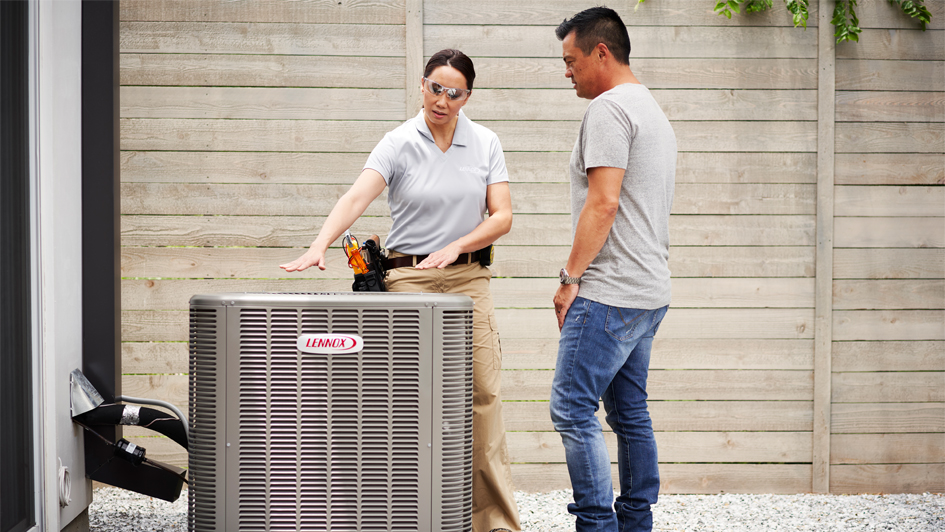
Selecting the appropriate HVAC system size for your home is vital. It impacts your ability to enjoy your home and your energy bills. In this HVAC sizing guide, the professionals at Diedrick's Heating and Air Conditioning will explain how to choose the correct size of heating and cooling system for your home, what factors they take into account and why choosing the most suitable size HVAC is so important to your convenience.
How Does HVAC System Size Affect Your Home Comfort and Efficiency
Proper HVAC size differs from home to home. Your HVAC system needs sufficient heating and cooling capacity to make your entire home pleasant. It shouldn't have to work extremely hard to keep up in extremely warm or frigid weather. However, an HVAC system that's too large is inefficient, costs more up front and can lead to complications that make your home less agreeable.
Key Features Professionals Consider for HVAC Sizing in Seymour, WI
To select the right HVAC system size for a home, the HVAC installation experts at Diedrick's Heating and Air Conditioning conduct a Manual J load calculation to determine how many British Thermal Units (BTUs) are needed to heat and cool and the home. A Manual J calculation evaluates multiple elements, such as:
- Home size: The total area of the home is arguably the most crucial factor in choosing the size of your HVAC system. How much space will your new HVAC system have to keep comfortable?
- Home insulation: A well- insulated home maintains the indoor temperature better, which can influence how much heating and cooling capacity you demand.
- Climate: The local climate in Seymour, WI, plays an important role in determining the appropriate size HVAC. Homes in warmer climates might need a system with a higher cooling capacity, while cooler regions may require less.
- Window size: Windows can be a considerable source of energy loss. The number, dimensions, type of glass used, and whether they’re single paned or double pane can considerably affect heating and cooling requirements.
- Sun exposure: A home that receives a lot of sunlight will naturally be warmer than one that doesn't, which affects central air sizing. Home placement in relation to prevailing winds and number of nearby shade trees also impact the appropriate HVAC size.
HVAC Size Mistakes Homeowners Often Make
A frequent mistake homeowners make when determining the size of their HVAC system is to base their decision on square footage. While the square footage of your home has a significant impact on what size HVAC you need, other considerations also influence how much heating and cooling capacity is required to keep your home comfortable.
Another typical mistake is not hiring a professional. It's essential to have an experienced HVAC technician perform a Manual J calculation, which takes all the essential factors into consideration to determine the appropriate HVAC size.
What Difference Does HVAC System Size Make?
An incorrectly sized system can result in comfort problems and increase expenses. Here's a deep dive into the pitfalls of a wrong-sized HVAC:
Issues with undersized HVAC systems:
- Shorter system life and breakdowns: HVAC systems that don't have enough power often run constantly to attempt to regulate the temperature of a home, leading to excessive wear and tear. This can cause breakdowns and even require premature HVAC replacement.
- An unpleasant home: Small HVAC systems lack the necessary capacity to heat and cool your entire residence, which can result in hot, stuffy rooms or areas of your home that are uncomfortably cold.
- Increased energy bills: An underpowered HVAC system that works constantly trying to keep up uses more energy, running up your monthly power bills and wasting your hard-earned money. A properly sized and energy-efficient HVAC system consumes less energy and helps to reduce your monthly bills.
Issues from oversized HVAC systems
- Wasted money: Larger HVAC systems are usually more costly, so buying more heating and cooling capacity than your home requires is an avoidable expense.
- Shorter system life and breakdowns: HVAC systems that are excessively large often cycle on and off, referred to as short cycling. This can cause wear and tear on your equipment, shortening its service life or requiring HVAC repair.
- Excessive indoor humidity: An HVAC system should control the moisture level in your home, but an oversized HVAC system may lack adequate runtime to accomplish that task. This can cause indoor air quality issues, such as mold growth.
Get the Right HVAC System Size by Working With the Pros at Diedrick's Heating and Air Conditioning
Now that you have learned some of the things that impact what HVAC system size is right for you, it's time to select a new heating and cooling system. Diedrick's Heating and Air Conditioning can help.
We’ll evaluate your home and provide you with a free, no-obligation estimate for HVAC installation. We’ll analyze your home to determine the best HVAC system size for you, so you can enjoy a cozy environment every day of the year.
Call 920-833-7967 today to set up your free estimate for HVAC installation in Seymour, WI.
